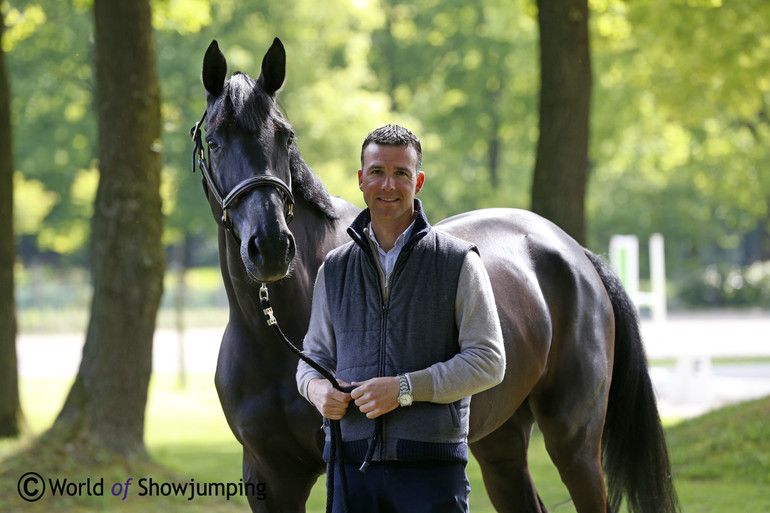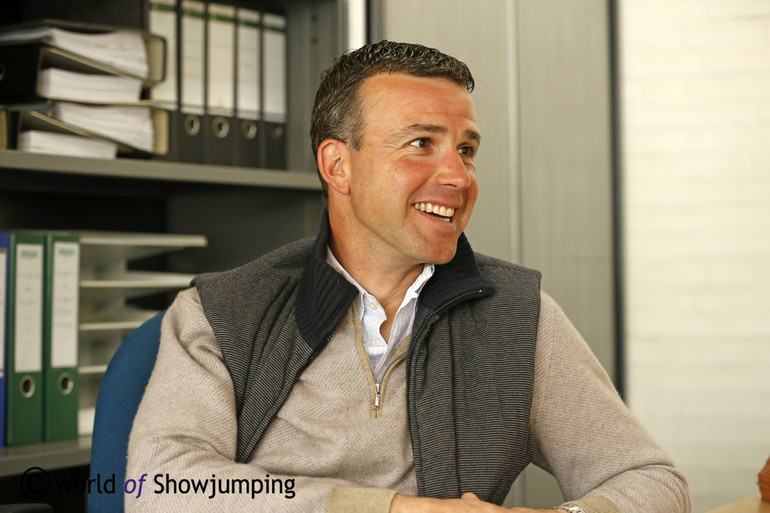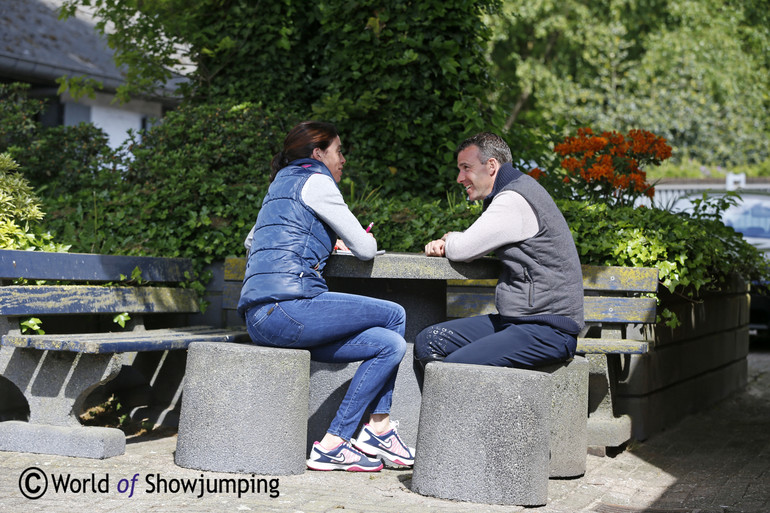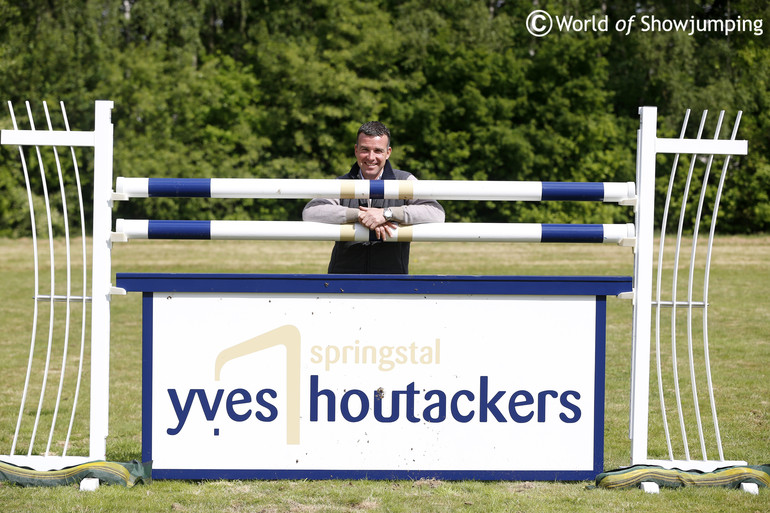Since Yves Houtackers decided to put his white breeches in the drawer - at least for the majority of the year - to switch from a successful international competition career to being more of a full-time trainer, his life has gotten progressively busier. Now, Houtackers experiences equal success spending his time on the sideline of the ring as he did inside of it.
World of Showjumping met up with Yves at his stable outside Weert, Netherlands to learn more about life as an international showjumping coach. That’s when we discovered there is a whole lot more going on in Houtacker’s already full schedule, and that he will never be able to stay completely away from entering the in-gate himself.
Houtackers was a successful rider, competing at the 2001 World Cup Finals and at the 2005 European Championships for the Netherlands. At only 31, Yves nevertheless decided to leave the top sport behind as a rider to mainly focus on the trainer role.
"I really like to train, but of course I also miss competing myself sometimes,” he says. "But I know how hard it is to make it to the top of the sport these days, so it is not a decision I in anyway regret making. I still compete sometimes now and again to train up and coming horses, or to help a student with their horse, but my main focus has become teaching. When I decided to switch my focus from competing to coaching, it was more or less because when I did both it ended up being done half way. As I got more and more students, I found my time was too spread out. So I had to choose and now my main focus is on my students. It feels better this way.”
Still, getting it all to add up is not always an easy task.With several students competing at international level, such as Joe Clee, Timothy Hendrix, Joy Lammers, Jamie Kermond and Line Raaholt, some serious planning is necessary to make sure everybody gets the help and support they need. “Sometimes my students are spread out all over the place with different shows around Europe, but if there is one show of particular importance for one of them, then I always try to organize things so I can be available. For the rest we look together to what kind of show it is, and how many students are there, and then I make a choice of where I need to be based on this."
Yves does not have any specific requirements as to who can train with him. "I have students at lots of different levels. The most important thing for me as a trainer is to see that there is a will to learn, and that the students are motivated. As a trainer it gives me the same satisfaction whether I help somebody jumping double clear in a five star Grand Prix or in a national class. The joy for each rider is no different and the feeling of achievement is the same.” One thing Yves always does though, is to ask about the riders goals. "Then I need to look at whether this is realistic or not. If it is totally out of reach, then I will tell the client I am not the right one. When you know a goal is unrealistic there's no point trying to chase it."
As to Houtacker’s philosophy, it is all about keeping it simple. “I don’t like to complicate things, and I certainly never try to alter things too much when it comes to the riding of somebody already established in the sport. If you do too much it's easy to take the natural feeling and instinct away from the rider, and I don’t want that. When I help those riders who already are at the top level, then it’s just about details, while for those with less experience it's more about getting into the system,” Yves explains.
“Whatever level I focus on, I feel that correct flat work, keeping the horses happy, and making a proper plan is necessary. There are so many shows now, so it is important to plan properly in order for rider and horse to reach their peak form at the most important shows. This of course differs from horse to horse. Some have to jump more than others, but I always speak a lot with the riders as to what each horse needs. For riders on a lower level, they maybe need to jump a bit more than an experienced rider, so their training and show schedule might differ from that of a professional.”
As to the development of the sport, Yves thinks more and more that riders not only need help for training - but also for the management part. “It’s more about the entire sport from A to Z now, and I think this kind of follow-up with riders will become more and more usual,” he says.
Based on Yves' experience, it is interesting to hear about what it takes to reach the top of the sport. "You can make it a long way with hard work and a lot of training, talent cannot bring you to the top of the sport alone. You sometimes see that those with a lot of talent might not make it to the top because they don’t work hard enough. Based on my own experience you can go further in the sport with a little less talent, as long as you are hardworking and determined. It brings you way more than if it is the other way around,” he smiles.
Although an estimated 90 % of his time is spent on his students, Yves does not use the remaining time to relax. When finished with his daily riding and training chores, there is more work to do. Houtackers was appointed as sport director for CHIO Rotterdam two years ago and he is also heavily involved in the Dutch Sport Horse Sales auction that runs in September every year.
“The role as sports director is quite a nice one. The last month and a half before the event is busy, but we are very organized so everything runs smoothly,” Yves says.
"The auction has been run for years now, and stands on it's own feet in many ways. We have a good group of clients that always return, and a very good system for sourcing our horses, although the latter of course takes time. So now it is more about thinking bigger and outside the box to get better,” Houtackers explains.
"Many of the horses seen at the auction are bred by ourselves or scouted at local shows. When the horses are auctioned off, we own them all ourselves, either solely or as co-owner. There is a risk that way, but I believe that is the only way. You need to believe enough in the horse to choose it yourself in order to sell it,“ Houtackers says. "In the horses we select, we look for rideability, that the horses are a good type for the sport and of course that they have that little extra. The clients demand quality no matter what level they are at. We don’t only look for Grand Prix horses, but horses for different levels. Our customers are not only five star Grand Prix riders or owners.”
Then, of course, Yves also has to make time to take care of his own business. Houtackers co-operates with Missy Clark and John Brennan at North Run Farm in the States, which also explains why Darragh Kenny chose Yves stable to use as his European base for the summer. “I am no big dealer though. I sell no more than around twenty horses a year, and I don’t really wish to sell a huge volume. I don’t buy in to sell next week if you know what I mean.”
“Yes, I work seven days a week,” he laughs about his commitments. “Although I hate office work, so it comes last. I get in a bad mood by it!"
Does Yves miss the feeling of competing we ask? “Well, I am still very involved, just in a different way.” Then he laughs and adds; "but of course there are times I wish I could just get on and do it myself!”
Photos by Jenny Abrahamsson / text by Jannicke Naustdal - copyright © worldofshowjumping.com 2015.












